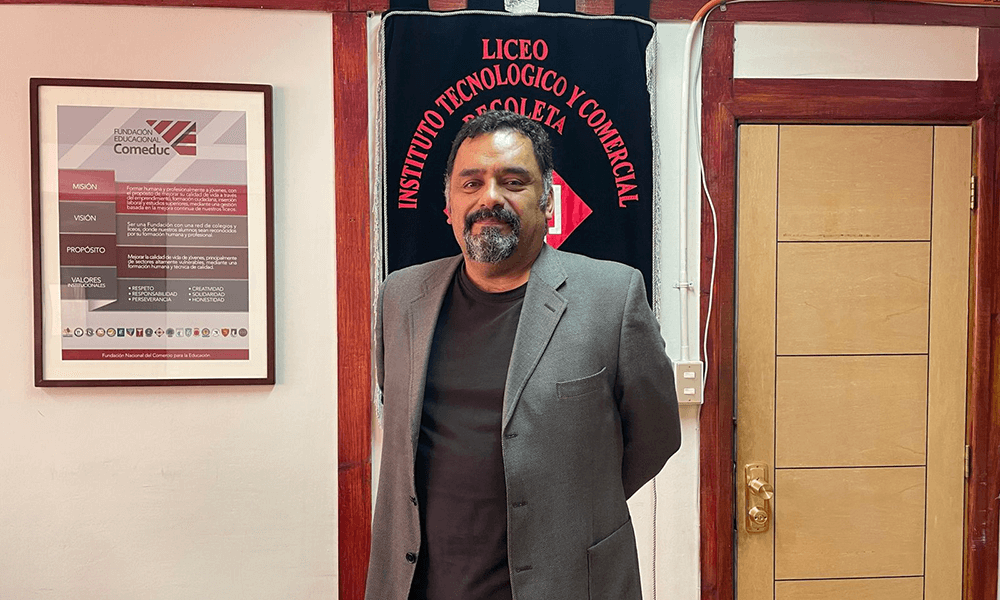In its 60 years of history, the Instituto Tecnológico y Comercial Recoleta (INTECO) has undergone several transformations. The establishment, which depends on the Fundación Nacional del Comercio para la Educación, works today with a mission that responds to the current times: to train young people who can adapt and successfully face a world in constant change and evolution.
With this objective in mind, the school was one of the more than 300 professional technical schools that participated in Fundación Luksic’s Aspiraciones Sobre el Futuro 2022 (Aspirations for the Future 2022). The initiative seeks to detect the motivations and barriers faced by students graduating from secondary technical-professional education when it comes to entering higher education, as well as to provide them with useful information on financing, scholarships and admission.
The director of INTECO, Claudio González, reflected on the importance of promoting the continuity of higher education and the transformation this has meant for the technical-professional ecosystem.
In its origins, secondary vocational education had the objective of training people who could quickly enter the labor market. However, for some time now, the alternative of TP students continuing their studies has been gaining prominence. What is your point of view on this change?
Entering higher education after graduating from secondary technical-professional education is still seen as an option, but in my opinion it is becoming less and less of an option and more and more of a duty. In the past it was much more complex to follow this path, many young people had to study at night and work during the day, but nowadays, with all the financing and free education policies available, entering higher education has become much more accessible.
How do you think progress can be made in integrating the continuity of higher education with technical-professional secondary education?
The main challenge in this sense is that there is no policy to adapt the two options. Our students finish high school and have to do an internship, which is sometimes extensive, to obtain their secondary technical-professional degree. But in view of the great options and alternatives available to enter higher education, students are choosing not to do this internship and are not graduating. I believe that this is an issue that needs to be solved and it involves making it easier for the internship to be carried out during the fourth year of secondary school.
You mentioned that nowadays it is much easier for young people to enter higher education. What do you think is the key to encourage more students to opt for this alternative?
Information is vital. The fact that young people have the necessary information to be able to enter higher education opens a powerful path for them. We have to consider that technical professional education is mostly made up of young people who come from highly vulnerable contexts, therefore, what we are experiencing today is a great opportunity, but to take advantage of it, it is necessary for them to know about these financing and free options. The Luksic Foundation’s Aspirations for the Future project was a great help for our children to be well informed about the range of options and to be able to make the best possible decision.
Precisely one of the results that Aspirations for the Future showed is that the majority of young people in professional technical education are not aware of the existing financing alternatives.
This is partly due to the fact that in many TP schools there is still an old paradigm that says that we only prepare students for the world of work. But that paradigm is a thing of the past; today higher education is a tool that makes a difference. Continuing studies means overcoming poverty, it means social mobility, it means personal, professional, intellectual and vocational development. The issue is that this transformation was very fast, and schools are like elephants, it is difficult to move them. That is why we, as a school, set ourselves the mission of adapting to the new times and being open to all the possibilities we can offer our students.
Can you tell us what it was like for the school to be part of Aspirations About the Future? Thinking especially about how useful it can be to have a diagnosis of this type in the decision making process.
I’ll be honest: it was comfortable. When the material arrives, the mentor arrives, she works with the young people, the results arrive, then the analysis arrives, in a way it’s like they did the job for us. We were happy. It is a project that today gave us the possibility to be much faster and more efficient in this change that we as an establishment have been incorporating, which is to trust that higher education is the way and is a good opportunity for our children.
“Aspirations about the Future” is part of the MueveTP initiative (www.muevetp.cl) of the Luksic Foundation. In its 2023 version, 487 technical-vocational high schools were enrolled in this program, which will benefit more than 55,800 students in their fourth year of secondary education in all regions of the country.

